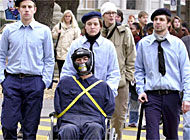Swiss win plaudits for treatment of prisoners

Switzerland has received a cautious thumbs-up from the Council of Europe for its treatment of prisoners.
The European committee for the prevention of torture applauded Switzerland’s treatment of prison inmates, but condemned its policy of forcibly repatriating foreigners.
Its findings were released after an investigation in six cantons during a ten-day visit to the Switzerland last February.
The committee’s secretary, Fabrice Kellens, told swissinfo that Swiss police generally treated inmates correctly during cross-examination and interrogation, and that the country was a good example to others.
“We heard only very few allegations of ill-treatment concerning the police and they were mainly linked to a disportionate use of force during arrest. But they were minimal in terms of quantity.”
Forcible repatriation
However, the committee, which is part of the Council of Europe, strongly criticised Switzerland’s policy of forcible repatriation. It said the practice was an example of “inhuman and degrading” treatment.
It referred to what the Swiss authorities term level “three and four of expulsion operations”, which come into force when a detainee is resisting his/her repatriation and is deemed to be dangerous.
Such operations include the use of plastic hand- and ankle-cuffs and a restraining jacket. In the most extreme cases strong adhesive tape is put over the detainee’s mouth.
Kellens said “the use of severe means of restraint” was of particular concern.
He added the committee had “formulated guidelines aimed at reducing that risk, such as the prohibition of methods likely to cause asphyxiation” and that most of the measures had already been taken into account by the Swiss authorities.
The Swiss government welcomed the findings and said regulations concerning forced repatriation were being prepared at a national level.
It added that the use of gags and other restraints that could impede a prisoner’s breathing were no longer allowed.
The committee’s criticisms over forced repatriation referred to two incidents where deportees died in custody.
In 1999 a 27-year-old Palestinian man died at Zurich airport, after sedated and gagged with tape to stop him from shouting.
The second fatality occurred last year when a Nigerian man died in custody in canton Valais shortly after leaving his cell on the day of his repatriation.
Police said the man lost consciousness after he had to be forcibly restrained and they were unable to revive him.
swissinfo with agencies

In compliance with the JTI standards
More: SWI swissinfo.ch certified by the Journalism Trust Initiative








You can find an overview of ongoing debates with our journalists here . Please join us!
If you want to start a conversation about a topic raised in this article or want to report factual errors, email us at english@swissinfo.ch.